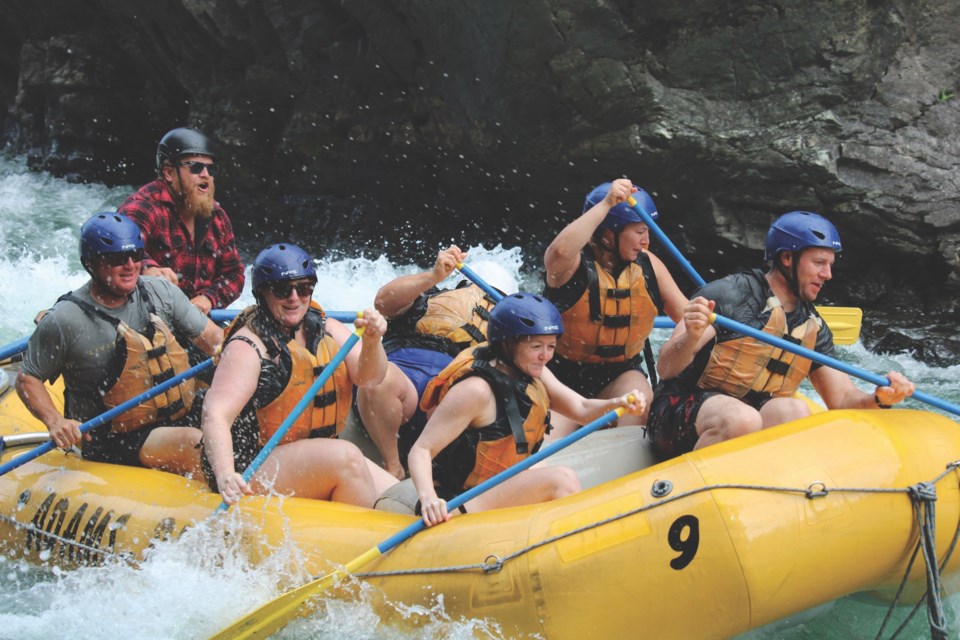I say the same thing every trip.
Each day during the summer, when I take clients whitewater rafting down the Adams River, a relatively languid little float through the Shuswap forest, there eventually comes a straightaway stretch where the current noticeably begins to pick up speed. Moss-covered trees hang half-toppled over either bank as the river narrows towards the coming bend. Savvy clients can sense that something is coming, while others remain blissfully unaware.
It’s hilarious what some people can miss.
“This is the moment in my day when I like to contemplate the concept of inevitability,” I tell my paddlers, hauling casually on the oars.
“Because just around that bend is our Canyon section, our Class 3 rapid. The highlight of the day. And now that you’ve chosen to take a place on this raft, you’re going through this rapid whether you like it or not. So you have two choices: freeze up and stop paddling, which makes it more likely you’ll fall in, or dig in and don’t stop paddling until we reach the bottom.”
I do my best to prepare my nervous clients, reminding them to keep ahold of the T-grip on their paddle no matter what and to keep their feet firmly secured in the safety strap, but nothing can really translate for them what they’re about to go through — fire hose-like spray, waves crashing into the boat from all sides, the chaotic spinning as we bounce from boulder to canyon wall and back. All told, the experience clocks in at just less than 30 seconds, but for the people in the boat, it can feel timeless. And as some of them slosh around in the bottom screaming (or crying, or both), I remind them all to “keep paddling!”
That’s an experience I’ve been through well over 100 times now. But no matter how many times you do it, you still don’t know for sure it’s going to go the way you want it to. Even the most experienced guides can flip a raft, or lose some paddlers over the side. Things can go wrong, and they will, and there’s nothing you can do to stop it.
And here’s where the overlap happens with my other job: telling stories. As both a reporter and a communications professional, it’s my job to find narratives that will prepare readers for some of the stark realities they’re facing. Throughout the pandemic, journalists tried to point in the direction of the proper safety measures, all the time working with incomplete information and watching the death toll rise. Now collectively we have Putin triggering the whole world, so that I have to wonder if my two young children are going to live through a Third World War. At the end of the day, everybody’s looking for somebody to answer that age-old question — “are we going to be okay?”
And that reminds me of the trucker guy. He was one of my clients at Adams River last summer, and he rumbled into our parking lot in a lifted truck that was taller than our bus. I’m pretty sure he was Albertan, covered in tattoos, with a scraggly brown beard and steel-toed boots. He didn’t look like the sort of person accustomed to being afraid, but sure enough at the beginning of the day he approached me to ask a question below his breath.
“Do people fall in on these trips?” he asked.
I reassured him that no, it’s very unlikely that somebody would fall in. And even if they did, we have handy safety throw bags full of rope to save them with. He nodded thoughtfully, thankfully, then went back to stand beside his girlfriend. A few minutes later he was assigned to my boat, and took up his place at my right hand. As we started down the river, he kept glancing back at me for reassurance. Somehow I knew he was going in the water, like it was fated, and when we hit the first stretch of white water I was ready when he rolled off the side and back-flopped into the waves.
The reason I have such a crystalline memory of this guy’s face is because of the next few moments, as he doggy-paddled in blind panic back for the boat. We kept making eye contact all the way through, as I pulled him hand-over-hand back to the boat. It took three of his friends to haul him back inside, where he sat stunned and coughing. He was rattled to his core, but trying not to show it.
“Are they any more rapids like that one?” he asked, his voice quavering.
“Didn’t I tell you about the Canyon?”
Will Johnson is a journalist, content creator, summer raft guide and father of two. He is freelancing for The Squamish Chief while reporter Steven Chua is on vacation.




